2017年初三英语中考备考词汇用法分析
- 格式:doc
- 大小:426.50 KB
- 文档页数:46
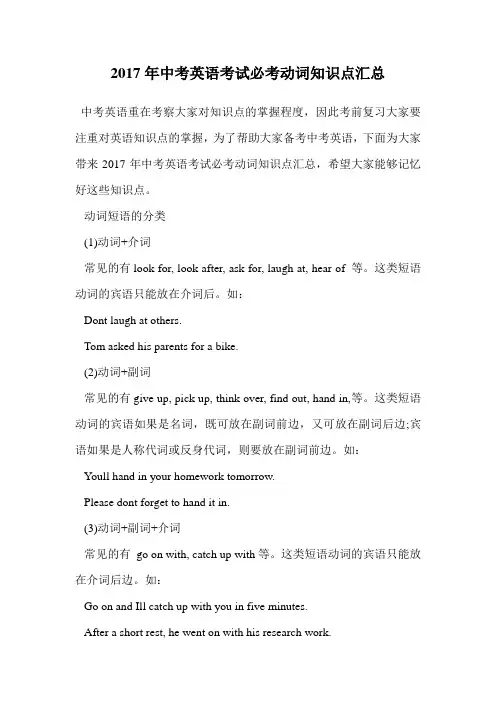
2017年中考英语考试必考动词知识点汇总中考英语重在考察大家对知识点的掌握程度,因此考前复习大家要注重对英语知识点的掌握,为了帮助大家备考中考英语,下面为大家带来2017年中考英语考试必考动词知识点汇总,希望大家能够记忆好这些知识点。
动词短语的分类(1)动词+介词常见的有look for, look after, ask for, laugh at, hear of 等。
这类短语动词的宾语只能放在介词后。
如:Dont laugh at others.Tom asked his parents for a bike.(2)动词+副词常见的有give up, pick up, think over, find out, hand in,等。
这类短语动词的宾语如果是名词,既可放在副词前边,又可放在副词后边;宾语如果是人称代词或反身代词,则要放在副词前边。
如:Youll hand in your homework tomorrow.Please dont forget to hand it in.(3)动词+副词+介词常见的有go on with, catch up with等。
这类短语动词的宾语只能放在介词后边。
如:Go on and Ill catch up with you in five minutes.After a short rest, he went on with his research work.(4)动词+名词+介词常见的有take care of, make use of, pay attention to, make fun of 等。
这类短语动词的宾语只能放在介词后边。
如:You should pay attention to your handwriting.We should make full use of our time.(5)动词+形容词常见的有leave open, set free, cut open等。
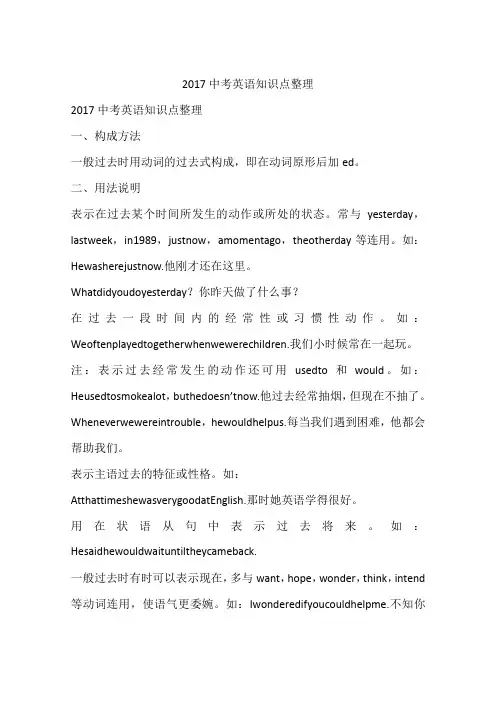
2017中考英语知识点整理2017中考英语知识点整理一、构成方法一般过去时用动词的过去式构成,即在动词原形后加ed。
二、用法说明表示在过去某个时间所发生的动作或所处的状态。
常与yesterday,lastweek,in1989,justnow,amomentago,theotherday等连用。
如:Hewasherejustnow.他刚才还在这里。
Whatdidyoudoyesterday?你昨天做了什么事?在过去一段时间内的经常性或习惯性动作。
如:Weoftenplayedtogetherwhenwewerechildren.我们小时候常在一起玩。
注:表示过去经常发生的动作还可用usedto和would。
如:Heusedtosmokealot,buthedoesn’tnow.他过去经常抽烟,但现在不抽了。
Wheneverwewereintrouble,hewouldhelpus.每当我们遇到困难,他都会帮助我们。
表示主语过去的特征或性格。
如:AtthattimeshewasverygoodatEnglish.那时她英语学得很好。
用在状语从句中表示过去将来。
如:Hesaidhewouldwaituntiltheycameback.一般过去时有时可以表示现在,多与want,hope,wonder,think,intend 等动词连用,使语气更委婉。
如:Iwonderedifyoucouldhelpme.不知你能不能帮我一下。
有时用一般过去时也是时态一致的需要。
如:Ididn’tknowyouwerehere.没想到你在这里。
注意:1.表示一系列的动作,尽管有先后,都用一般过去时,最后两个动词之间用and连结。
如:Heopenedthedoor,rushedoutandthendisappeared.他打开门,冲了出去,然后就消失了。
2.注意在语境中理解“我刚才/原来还不……”。
如:—Yourphonenumberagain?Ididn’tquitecatchit.—It’s2566666.请再说一次你的电话号码,好吗?我刚才没听清楚。
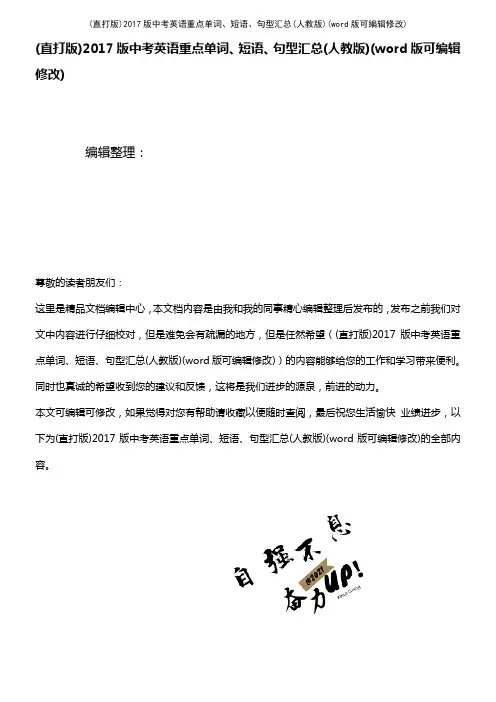
(直打版)2017版中考英语重点单词、短语、句型汇总(人教版)(word版可编辑修改)编辑整理:尊敬的读者朋友们:这里是精品文档编辑中心,本文档内容是由我和我的同事精心编辑整理后发布的,发布之前我们对文中内容进行仔细校对,但是难免会有疏漏的地方,但是任然希望((直打版)2017版中考英语重点单词、短语、句型汇总(人教版)(word版可编辑修改))的内容能够给您的工作和学习带来便利。
同时也真诚的希望收到您的建议和反馈,这将是我们进步的源泉,前进的动力。
本文可编辑可修改,如果觉得对您有帮助请收藏以便随时查阅,最后祝您生活愉快业绩进步,以下为(直打版)2017版中考英语重点单词、短语、句型汇总(人教版)(word版可编辑修改)的全部内容。
中考必背单词、短语、句型第(一)讲7上 Starter 1~4一、必背单词Starter Units 1~3 1.morning n.早晨;上午2.afternoon n.下午3.evening n.晚上;傍晚4.how adv。
怎样;如何5.fine adj. 健康的;美好的6.thanks interj。
& n.感谢;谢谢7.map n。
地图8.cup n. 杯子9.ruler n。
尺;直尺10.English n.英语adj. 英格兰的;英语的11.orange n.橙子12.jacket n.夹克衫;短上衣13.spell v。
用字母拼;拼写14.please interj。
请15.colo(u)r n.颜色16.red adj. & n. 红色(的)17.yellow adj。
& n. 黄色(的)18.green adj。
& n。
绿色(的)19.blue adj。
&n。
蓝色(的)20.black adj。
&n. 黑色(的)21.white adj. &n。
白色(的) 22.purple adj. &n。
紫色(的) 23.brown adj. &n. 棕色(的);褐色(的)Unit 1 24.name n.名字,名称25.nice adj。
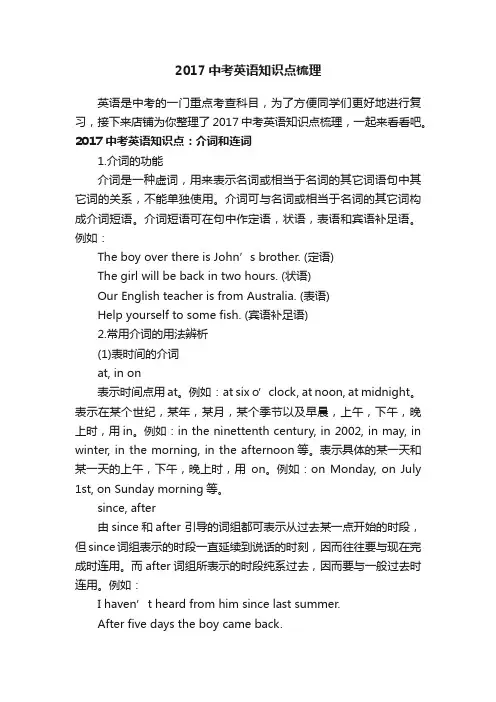
2017中考英语知识点梳理英语是中考的一门重点考查科目,为了方便同学们更好地进行复习,接下来店铺为你整理了2017中考英语知识点梳理,一起来看看吧。
2017中考英语知识点:介词和连词1.介词的功能介词是一种虚词,用来表示名词或相当于名词的其它词语句中其它词的关系,不能单独使用。
介词可与名词或相当于名词的其它词构成介词短语。
介词短语可在句中作定语,状语,表语和宾语补足语。
例如:The boy over there is John’s brother. (定语)The girl will be back in two hours. (状语)Our English teacher is from Australia. (表语)Help yourself to some fish. (宾语补足语)2.常用介词的用法辨析(1)表时间的介词at, in on表示时间点用at。
例如:at six o’clock, at noon, at midnight。
表示在某个世纪,某年,某月,某个季节以及早晨,上午,下午,晚上时,用in。
例如:in the ninettenth century, in 2002, in may, in winter, in the morning, in the afternoon等。
表示具体的某一天和某一天的上午,下午,晚上时,用on。
例如:on Monday, on July 1st, on Sunday morning等。
since, after由since和after 引导的词组都可表示从过去某一点开始的时段,但since词组表示的时段一直延续到说话的时刻,因而往往要与现在完成时连用。
而after词组所表示的时段纯系过去,因而要与一般过去时连用。
例如:I haven’t heard from him since last summer.After five days the boy came back.in, afterin与将来时态连用时,表示“过多长时间以后”的意思,后面跟表示一段时间的词语。
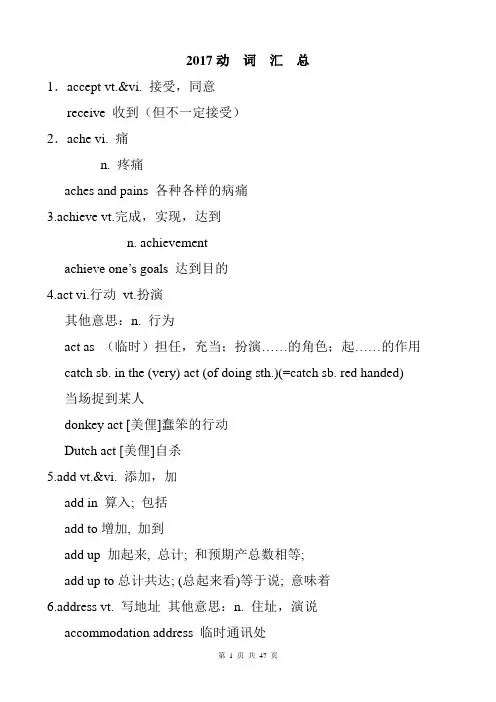
2017动词汇总1.accept vt.&vi. 接受,同意receive 收到(但不一定接受)2.ache vi. 痛n. 疼痛aches and pains 各种各样的病痛3.achieve vt.完成,实现,达到n. achievementachieve one’s goals 达到目的4.act vi.行动vt.扮演其他意思:n. 行为act as (临时)担任,充当;扮演……的角色;起……的作用catch sb. in the (very) act (of doing sth.)(=catch sb. red handed) 当场捉到某人donkey act [美俚]蠢笨的行动Dutch act [美俚]自杀5.add vt.&vi. 添加,加add in 算入; 包括add to增加, 加到add up 加起来, 总计; 和预期产总数相等;add up to总计共达; (总起来看)等于说; 意味着6.address vt. 写地址其他意思:n. 住址,演说accommodation address 临时通讯处be addressed to ab. 寄给……7.advise vt. 劝告,建议,通知advice un.建议a piece of adviceadvise sb. to do sth . 建议……做……8.afford vt. 负担得起,买得起,提供afford time/money (动词前往往有情态动词can或can’t)9. agree vt.&vi. 同意,赞成agree like cats and dogs 水火不相容agree to do 同意做……。
agree with同意...的意见; 与...一致; 对...适合10.aim vi. 瞄准,针对其他意思:n. 目标,目的11.allow vt. 准许allowance 津贴allow doing 允许做……allow sb. to do 允许某人做……be allowed to do 被允许做……12.answer vt. 回答,答复其他意思:n. 答案,回答soft answer 温和[委婉]的回答answer the door /telephonethe answer to the questionanswer the question = reply to the question13.arrive vi. 到达n arrivalarrive at/in 到达(目的地); 达到, 得出(结论等)(没有明确地点arrive)=get to = reach (够到……,达到某种水平或数字)14.ask vt. 询问,请求,要求ask sb. for sth 要; 请求, 征求要(价) 找ask sb. (not) to do sth.15.avoid vt.避免,撤销avoid doing 避免做某事16.awake vt.唤醒vi.醒其他意思:adj. 醒着的be wide/broad awake 完全醒着警觉; 不易上当受骟完全知道, 充分觉察到awake to the fact that 认识到...的事实be/keep awake 醒着17.wake v. 醒wake up 醒来e.g. James usually wakes up early.wake sb up 叫醒……e.g. My mother wakes me up at six o’clock.辨析:①wake多用于不及物动词②waken只用于及物动词③awake指唤醒(意志……)也可为adj指清醒的18.be (is am are was were being been)v. 是存在aux.v (无词义)Let it be. 随它去be+及物动词过去分词构成被动语态be+现在分词构成进行时be+有to的不定式表示约定计划职责义务愿望可能命运等The book is to come out.You are not to do that. 你不该那样做.be for 到…去赞成I’m for Shanghai.We are for just war.be from 从…来生在(某处)be gone. 走开,不见了。
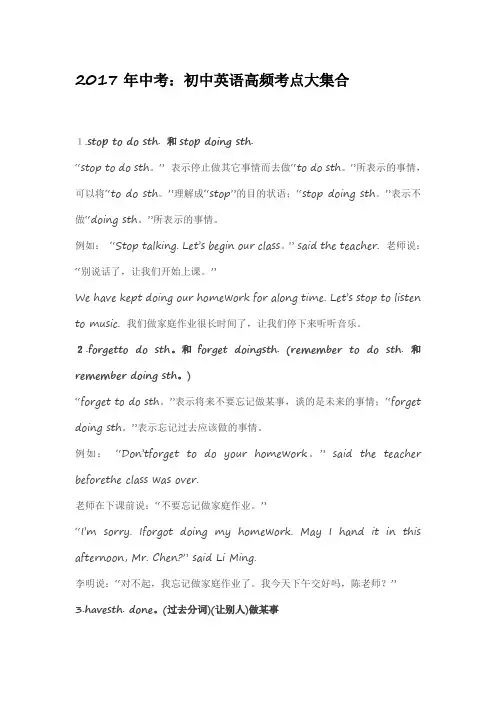
2017年中考:初中英语高频考点大集合1.stop to do sth. 和stop doing sth.“stop to do sth。
” 表示停止做其它事情而去做“to do sth。
”所表示的事情,可以将“to do sth。
”理解成“stop”的目的状语;“stop doing sth。
”表示不做“doing sth。
”所表示的事情。
例如:“Stop talking. Let’s begin our class。
” said the teacher. 老师说:“别说话了,让我们开始上课。
”We have kept doing our homework for along time. Let’s stop to listen to music. 我们做家庭作业很长时间了,让我们停下来听听音乐。
2.forgetto do sth。
和forget doingsth. (remember to do sth. 和remember doing sth。
)“forget to do sth。
”表示将来不要忘记做某事,谈的是未来的事情;“forget doing sth。
”表示忘记过去应该做的事情。
例如:“Don’tforget to do your homework。
” said the teacher beforethe class was over.老师在下课前说:“不要忘记做家庭作业。
”“I’m sorry. Iforgot doing my homework. May I hand it in this afternoon, Mr. Chen?” said Li Ming.李明说:“对不起,我忘记做家庭作业了。
我今天下午交好吗,陈老师?”3.havesth. done。
(过去分词)(让别人)做某事例如:I had my hair cut yesterdayafternoon. 我昨天下午理了发。
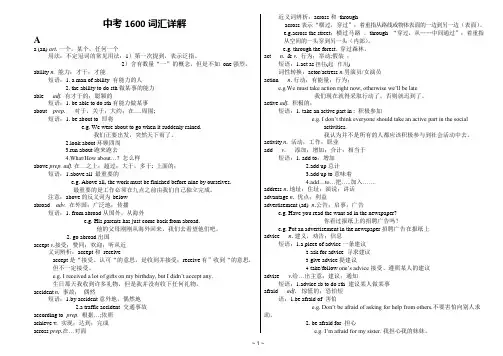
中考1600 词汇详解Aa (an) art. 一个,某个,任何一个用法:不定冠词的常见用法:1)第一次提到,表示泛指。
2)含有数量“一”的概念,但是不如one 强烈。
ability n. 能力;才干;才能短语:1. a man of ability 有能力的人2. the ability to do sth 做某事的能力able adj. 有才干的;聪颖的短语:1. be able to do sth 有能力做某事about prep. 对于,关于;大约;在….周围;短语:1. be about to 即将e.g. We were about to go when it suddenly rained.我们正要出发,突然天下雨了。
2.look about 环顾四周3.run about 跑来跑去4.What/How about…? 怎么样above prep. adj. 在…之上;超过;大于,多于; 上面的;短语:1.above all 最重要的e.g. Above all, the work must be finished before nine by ourselves.最重要的是工作必须在九点之前由我们自己独立完成。
注意:above 的反义词为belowabroad adv. 在外国;广泛地;传播短语:1. from abroad 从国外,从海外e.g. His parents has just come back from abroad.他的父母刚刚从海外回来,我们去看望他们吧。
2.go abroad 出国accept v.接受;赞同;欢迎;听从近义词辨析:accept 和receiveaccept 是“接受、认可“的意思,是收到并接受;receive 有”收到“的意思,但不一定接受。
e.g. I received a lot of gifts on my birthday, but I didn’t accept any.生日那天我收到许多礼物,但是我并没有收下任何礼物。
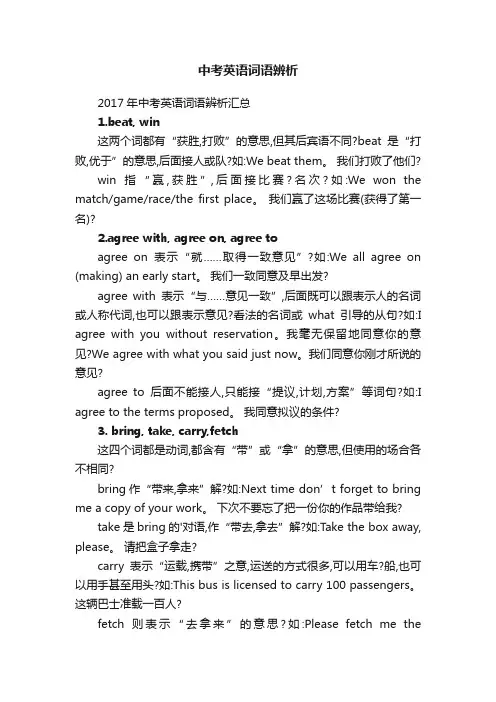
中考英语词语辨析2017年中考英语词语辨析汇总1.beat, win这两个词都有“获胜,打败”的意思,但其后宾语不同?beat是“打败,优于”的意思,后面接人或队?如:We beat them。
我们打败了他们?win指“赢,获胜”,后面接比赛?名次?如:We won the match/game/race/the first place。
我们赢了这场比赛(获得了第一名)?2.agree with, agree on, agree toagree on表示“就……取得一致意见”?如:We all agree on (making) an early start。
我们一致同意及早出发?agree with表示“与……意见一致”,后面既可以跟表示人的名词或人称代词,也可以跟表示意见?看法的名词或what引导的从句?如:I agree with you without reservation。
我毫无保留地同意你的意见?We agree with what you said just now。
我们同意你刚才所说的意见?agree to后面不能接人,只能接“提议,计划,方案”等词句?如:I agree to the terms proposed。
我同意拟议的条件?3. bring, take, carry,fetch这四个词都是动词,都含有“带”或“拿”的意思,但使用的场合各不相同?bring作“带来,拿来”解?如:Next time don’t forget to bring me a copy of your work。
下次不要忘了把一份你的作品带给我?take是bring的'对语,作“带去,拿去”解?如:Take the box away, please。
请把盒子拿走?carry表示“运载,携带”之意,运送的方式很多,可以用车?船,也可以用手甚至用头?如:This bus is licensed to carry 100 passengers。
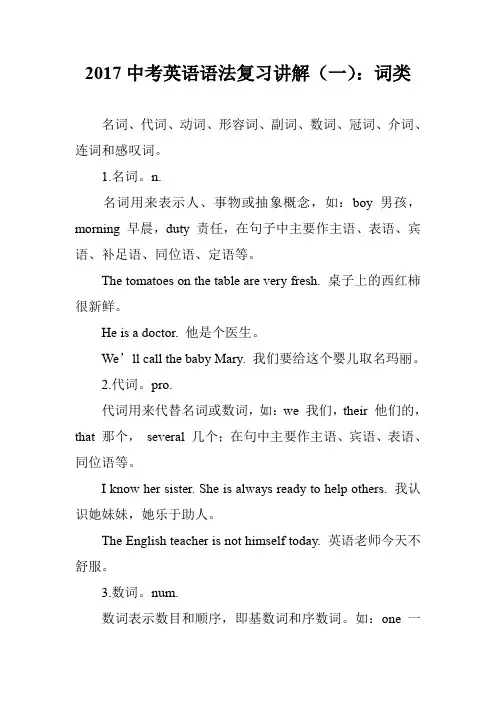
2017中考英语语法复习讲解(一):词类名词、代词、动词、形容词、副词、数词、冠词、介词、连词和感叹词。
1.名词。
n.名词用来表示人、事物或抽象概念,如:boy 男孩,morning 早晨,duty 责任,在句子中主要作主语、表语、宾语、补足语、同位语、定语等。
The tomatoes on the table are very fresh. 桌子上的西红柿很新鲜。
He is a doctor. 他是个医生。
We’ll call the baby Mary. 我们要给这个婴儿取名玛丽。
2.代词。
pro.代词用来代替名词或数词,如:we 我们,their 他们的,that 那个,several 几个;在句中主要作主语、宾语、表语、同位语等。
I know her sister. She is always ready to help others. 我认识她妹妹,她乐于助人。
The English teacher is not himself today. 英语老师今天不舒服。
3.数词。
num.数词表示数目和顺序,即基数词和序数词。
如:one 一个,thousand 千,twelfth 第十二;在句子主要作主语、宾语、表语、定语等。
Three of us are from Beijing. 我们中有三个人是北京来的。
You are the second one to come to see me. 你是第二个来看我的人。
We don’t need so many people. We need only five.我们不需要这么多人,我们只需要五个。
4.形容词。
adj.形容词表示人或事物的特征,如big、white在句中主要作表语、定语、补足语等。
Look! Your bike is bigger than mine. 看,你的自行车比我的大。
He found the door open. 他发现门是开着的。
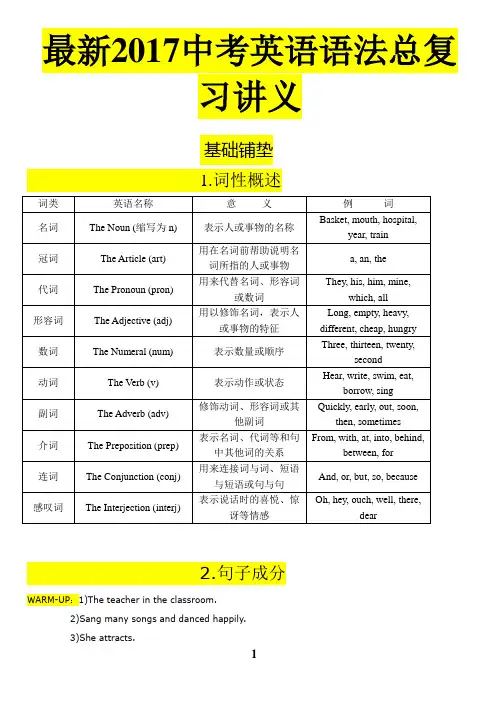
最新2017中考英语语法总复习讲义基础铺垫1.词性概述2.句子成分WARM-UP:1)The teacher in the classroom.2)Sang many songs and danced happily.3)She attracts.4)Many people living in the country.5)All the books on the desk over there.以上这些形式都不能构成英语句子。
英语句子(sentence)=主语+谓语(核心:主动词)I.八大成分的概念和构成1.主语(名词代词形):句子的主体,是谓语陈述,说明的对象。
If you want the rainbow you have to put up with the rain.不经历风雨,怎么见彩虹。
The secret of success is to start from scratch and keep on scratching.成功的秘诀在于从磨练开始,并要坚持不断磨练。
充当主语的形式:1)名词2)代词3)名词短语4)名词从句5)数词6)不定式7)-ing形式8)介词短语(少见)形式主语(名词从句,不定式,动名词)(见第六讲主语和宾语)2.谓语:表示主语的行为或进行的活动。
I have a dream.You don’t always want what you need, or need what you want.所需之物未必皆所欲,所欲未必皆所需。
谓语形式:动词(英语句子的灵魂)3.宾语:行为或活动的对象,接受者或受影响者。
You don’t find opportunities…you make them.你找不到机会。
你得去创造机会。
You probably won’t hear opportunity knock if your television is always on.如果你常开着电视,你就可能听不到机会的敲门声。
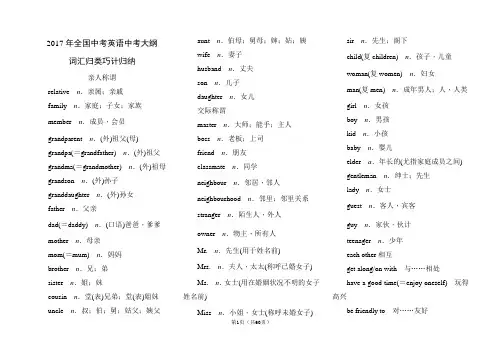
2017年全国中考英语中考大纲词汇归类巧计归纳亲人称谓relative n.亲属;亲戚family n.家庭;子女;家族member n.成员,会员grandparent n.(外)祖父(母) grandpa(=grandfather)n.(外)祖父grandma(=grandmother)n.(外)祖母grandson n.(外)孙子granddaughter n.(外)孙女father n.父亲dad(=daddy)n.(口语)爸爸,爹爹mother n.母亲mom(=mum)n.妈妈brother n.兄;弟sister n.姐;妹cousin n.堂(表)兄弟;堂(表)姐妹uncle n.叔;伯;舅;姑父;姨父aunt n.伯母;舅母;婶;姑;姨wife n.妻子husband n.丈夫son n.儿子daughter n.女儿交际称谓master n.大师;能手;主人boss n.老板;上司friend n.朋友classmate n.同学neighbour n.邻居,邻人neighbourhood n.邻里;邻里关系stranger n.陌生人,外人owner n.物主,所有人Mr.n.先生(用于姓名前)Mrs.n.夫人,太太(称呼已婚女子)Ms.n.女士(用在婚姻状况不明的女子姓名前)Miss n.小姐,女士(称呼未婚女子)sir n.先生;阁下child(复children)n.孩子,儿童woman(复women)n.妇女man(复men)n.成年男人;人,人类girl n.女孩boy n.男孩kid n.小孩baby n.婴儿elder a.年长的(尤指家庭成员之间)gentleman n.绅士;先生lady n.女士guest n.客人,宾客guy n.家伙,伙计teenager n.少年each other相互get along/on with与……相处have a good time(=enjoy oneself)玩得高兴be friendly to对……友好第1页(共60页)make friends with与……交朋友single a.单身的;单一的,单个的name n.名字people n.人,人们;人民person n.人personal a.个人的,私人的host n.东道主,主人;节目主持人enemy n.敌人,仇人king n.国王,君主queen n.王后,女王洲际、国家Africa n.非洲African adj.非洲(人)的n.非洲人Asia n.亚洲Asian a.亚洲的,亚洲人的n.亚洲人America n.美国;美洲American a.美国(洲)的;美国(洲)n.美国人the USA(=the US=the United States)abbr.美国Australia n.澳洲,澳大利亚Australian a.澳洲的,澳大利亚的,澳大利亚人的n.澳大利亚人Britain n.大不列颠British a.英国(人)的Canada n.加拿大Canadian a.加拿大的,加拿大人的n.加拿大人China n.中国Chinese a.中国(人)的;中文的n.中国人;中文;汉语Europe n.欧洲European a.欧洲的,欧洲人的n.欧洲人England n.英格兰English a.英国的,英国人的,英语的n.英语the UK(=the United Kingdom)abbr.联合王国France n.法国French n.法语a.法国(人)的;法语的Germany n.德国German a.德国(人)的;德语的n.德国人;德语India n.印度Indian a.(美洲)印第安人的;印度人的n.印第安人;印度人Italy n.意大利第2页(共60页)Japan n.日本Japanese a.日本的,日本人的;日语的n.日本人;日语Russia n.俄国Russian a.俄国人的,俄国的,俄语的n.俄国人,俄语地域级别country n.国家;农村,乡下countryside n.乡下,农村village n.村庄town n.城镇,城city n.市,城市,都市province n.省capital n.首都;国都state n.国家,州national a.国家的,民族的international a.国际的world n.世界society n.社会hometown n.故乡local a.本地的归类巧记法时刻汇集o'clock n.点钟noon n.中午at noon在中午moment n.片刻,瞬间at the moment此刻quarter n.一刻钟from prep.从;从……起at the age of在……岁时now ad.现在just now刚才present a.现在的at present目前immediately(=at once=right now=now)ad.立即as soon as一……就……not...until...直到……才……when conj.当……的时候on time准时in time及时what time几点;什么时间时期汇集today ad.&n.今天;现在,当前tomorrow ad.&n.明天yesterday ad.&n.昨天period n.一段时间;时期tonight ad.&n.今晚the day after tomorrow后天the day before yesterday前天morning n.早晨;上午afternoon n.下午evening n.傍晚,晚上第3页(共60页)in the morning/afternoon/evening在早上(上午)/下午/傍晚night n.夜;夜间at night在晚上day n.(一)天,(一)日;白天the whole day(=all day)一整天second n.秒minute n.分钟;一会儿,瞬间hour n.小时half an hour半小时week n.周month n.月year n.年century n.世纪,百年future n.将来in the future在将来some time在未来的某时a.m.(A.M.)上午p.m.(P.M.)下午day and night日日夜夜Day 4归类巧记法星期与月份week n.星期Monday n.星期一Tuesday n.星期二Wednesday n.星期三Thursday n.星期四Friday n.星期五Saturday n.星期六Sunday n.星期日weekday n.平日weekend n.周末date n.日期month n.月份January n.一月February n.二月March n.三月April n.四月May n.五月June n.六月July n.七月August n.八月September n.九月October n.十月November n.十一月December n.十二月时段与季节after ad.后来prep.在……之后conj.在……以后after class课后ago ad.以前later ad.后来during prep.在……期间;在……过程中since prep.从……起ever since自那时起直到现在for prep.为,为了soon ad.不久until prep.&conj.直到……为止第4页(共60页)while conj.在……的时候,和……同时n.一会儿,一段时间by prep.靠,通过;沿着last v.持续for ever永远from now on从今以后,今后from then on从那时起from...to...从……到……once upon a time从前,很久以前so far到目前为止season n.季节spring n.春天,春季summer n.夏天,夏季autumn(=fall)n.秋天,秋季winter n.冬天,冬季above all首先,首要begin(began,begun)v.开始,着手start v.起始,着手;出发end n.末尾;终点v.结束,终止finish v.结束;做完all over结束;到处Day 5归类巧记法基数与量词amount n.数量;总额count v t.数,计数NO.(=number)n.数字;号码a(an)art.一(个、件)zero num.零one num.一two num.二three num.三four num.四five num.五six num.六seven num.七eight num.八nine num.九ten num.十eleven num.十一twelve num.十二thirteen num.十三fourteen num.十四fifteen num.十五sixteen num.十六seventeen num.十七eighteen num.十八nineteen num.十九twenty num.二十twentyone num.二十一thirty num.三十forty num.四十fifty num.五十sixty num.六十seventy num.七十eighty num.八十ninety num.九十第5页(共60页)hundred num.百hundreds of几百,成百上千thousand n.千thousands of成千上万,几千million n.百万millions of成百万上千万,数以百万计billion n.十亿序数与顺序order n.顺序first num.第一at first首先second num.第二third num.第三fourth num.第四fifth num.第五sixth num.第六seventh num.第七eighth num.第八ninth num.第九twelfth num.第十二twentieth num.第二十twentyfirst num.第二十一finally/in the end最后,终于=at lastthen ad.然后next ad.随后,然后,下一步turn v.转向;转弯one by one一个接一个Day 6归类巧记法方向与位置in prep.在……(之内);以……ad.在屋里;进入,到达next to紧接着,相邻,次于over prep.在……的正上方on prep.在……的上面under prep.在……的下面behind prep.在……的后面in front of在……的前面above prep.在……上面a.上面的ad.在上面below prep.在……下面,低于high a.高的;高度的ad.高地low a.&ad.低的;矮的opposite=across from a.对面的prep.在……的对面among prep.(三个以上)在……之间between prep.(两者)在……之间before prep.在……以前;在……前面ad.以前conj.在……之前beside prep.在旁边;在附近inside n.里面prep.在……里面ad.在里面outside n.外面prep.在……外面ad.在外面;向外面by prep.靠近,在……旁第6页(共60页)close a.亲密的ad.紧密地round ad.迂回地prep.环绕一周,围着about ad.大约;四处prep.关于;在……周围up a.上面的,向上的,上行的in the front of在……内部的前部at the back of在……的后部in the middle of在……的中间center n.中心,中央left a.左边的ad.向左n.左,左边right a.右边的ad.向右n.右,右边top n.顶部,(物体的)上面back n.背部east a.东方的;东部的;朝东的;从东方来的ad.在东方;向东方;从东方n.东方west a.西方的;西部的;朝西的;从西方来的ad.在西方;向西方;从西方n.西方south a.南方的;南部的;朝南的;从南方来的ad.在南方;向南方;从南方n.南方north a.北方的;北部的;朝北的;从北方来的ad.在北方;向北方;从北方n.北方eastern a.东方的Western a.西方的southern a.南方的northern a.北方的lie v.位于Day 7归类巧记法运动及方式along ad.向前prep.沿着;顺着up ad.向上;起来;在……以上down prep.沿着,沿……而下ad.向下towards prep.向,朝,对于into prep.到……里;向内for prep.向……;往……back ad.回(原处);向后come(came,come)v i.来,来到come/go back回来/去get back返回;回来;回家outdoor a.户外的out ad.出外;在外,向外面through prep.穿(通)过;从始至终ad.穿(通)过;自始至终,彻底go(went,gone)v i.去;进行第7页(共60页)go through通过go out出去come on来吧,赶快come in进入,进来come out出来come down落,下来come up with想出(主意)around ad.在周围;在附近prep.在……周围here n./ad.这里;在这里;向这里there n.那里,那儿ad.在那里,往那里all over到处,遍及leave(left,left)v.离开enter v t.进入move v.移动,搬动,搬家return v.回,归stay n.&v i.停留,逗留,待step v i.走;跨步get away逃;离go away走开,离去run away逃跑,失控set off动身,起程up and down上下,起落part v.离开;分开距离与速度distance n.距离meter n.米,公尺kilometer n.千米(公里)far(farther,farthest;further,furthest)a.&ad.远的;远地far away远离near a.近的ad.附近,邻近prep.靠近from prep.距;来自from...to...从……到……arrive v i.到达arrive at(in) a place到达某地reach v.到达;伸手(脚等)够到get to到达quick a.快的quickly ad.快地slow a.慢慢的,缓慢的slowly ad.慢慢地,缓慢地fast a.&ad.快的(地),迅速的(地),紧密的(地)away ad.离开;远离Day 8归类巧记法意愿与范围agree v.同意,应允agree with sb.同意某人的看法,与某第8页(共60页)人看法一致allow v t.允许,准许OK ad.(口语)好,对,不错all right行了,好吧refuse v i.拒绝,不愿against prep.反对except prep.除……之外include v t.包含,包括but prep.除了,除……外需求、选择与拥有necessary a.必需的,必要的need n.需要,需求aux.&v.需要,必须choose(chose,chosen)v t.选择or conj.或;就是;否则either...or...或者……或者……have(had,had)v t.有own a.自己的v.拥有,所有owner n.物主,所有人there be有appear v.出现,显露频率与程度seldom ad.不常;很少sometimes(=at times)ad.有时often ad.常常,经常usually ad.通常地,平常地always ad.总是;一直;永远once ad.一次twice ad.两次three times a week一周三次some times几次daily ad.每天everyday adj.每天的;日常的regular a.规则的;定期的all the time一直again ad.再一次;再;又again and again反复地,再三地once again再一次no longer不再not any more不再now and then不时,偶尔never ad.决不,从来没有hardly ad.几乎不already ad.已经ever ad.曾经,无论何时still ad.仍然,还yet ad.尚,还,仍然never ad.决不very ad.很,非常rather ad.相当,宁可quite ad.相当,很,非常,确实如此even ad.甚至,连(……都);更第9页(共60页)mostly ad.主要地;通常general a.总的;普遍的;常规的too ad.太,也;很,非常just ad.恰好;仅only ad.仅仅,只,才so ad.如此,这么such ad.那么like prep.像,跟……一样in surprise吃惊,惊讶sooner or later迟早so...that...太……以至于……too...to...太……以至于不……not at all一点儿也不also ad.也either ad.(用于否定句后)也as well也,还有Day 9归类巧记法数量与倍值point n.点quarter n.四分之一some pron.几个,数个a.若干any pron.(无论)哪一个;任何a.任何的ad.(用于疑问句、否定句)一些;什么several pron.几个,数个bit n.一点儿,一些,少量a bit(of)有一点儿little(less,least)a.小的,少的a little一点儿,少许(修饰不可数名词)few pron./a.不多;少数;不多的;少数的a few一点,少许(修饰可数名词)many(more,most)pron.许多的;大量的a.许多的(修饰可数名词)much(more,most)pron.许多人(或物)a.许多的(修饰不可数名词)a lot of(=lots of)许多的,大量的plenty n.充足,大量plenty of大量的a number of一些,许多percent n.百分比double a.两倍的;双的n.两个;双single a.单个的,单一的enough n.足够;充足a.足够的;充分的ad.足够地;充分地only a.唯一的,仅有的crowd n.人群group n.组,群team n.队第10页(共60页)line n.排,行twice ad.两倍total n.总数;合计材质与度量material n.材料wood n.木头,木材wooden a.木制的,木头的cotton n.棉花silk n.(蚕)丝,丝织品board n.木板;布告牌kind n.种;类a kind of一种,一类all kinds of各种各样type n.种类kilo(=kilogram)n.千克size n.尺寸copy n.一本(份、册……) block n.一大块piece n.一块(片、张、件……)pair n.一双,一对crowd n.一群weight n.重,重量height n.高,高度衣服与鞋袜clothes n.衣服;各种衣物coat n.外套;皮毛v t.给……穿外套suit n.西服;套装shirt n.衬衫skirt n.短裙sweater n.运动衫,毛衣shorts n.(pl.)短裤pants n.(pl.)裤子trousers n.(pl.)裤子Tshirt n.T恤衫belt n.腰带,裤带cap n.(无檐的或仅在前面有檐的)帽子hat n.(一般指有边的)帽子;礼帽dress n.女服,连衣裙;(统指)服装v.穿衣;穿着glove n.手套jacket n.短上衣,夹克衫jeans n.牛仔裤raincoat n.雨衣scarf n.领巾,围巾shoe n.鞋sock n.短袜tie n.领带Day 10归类巧记法人称与指示代词第11页(共60页)this a.&pron.这,这个that a.&pron.那,那个these a.&pron.这些those a.&pron.那些all a.全部的;所有的pron.全部;全体人员none pron.没有任何东西,无一人both a.两;双,既……又……(两者)都不;也不)也.别人,别的东西rest n.剩余的部分else a.别的,其他的extra a.额外的,另外的疑问副词及代词what pron.什么,怎么样which pron.那(哪)一个;那(哪)一些who adj pron.谁whose pron.谁的whom pron.谁(who的宾格)when ad.什么时候,何时where ad.在哪里;往哪里why ad.为什么if conj.是否,是不是;如果whether conj.是否how ad.怎样,如何Day 11归类巧记法身体部位eye n.眼睛nose n.鼻子mouth n.嘴ear n.耳朵face n.脸hair n.头发tooth(复teeth)n.牙齿head n.头skin n.皮肤body n.身体第12页(共60页)leg n.腿arm n.臂knee n.膝hand n.手foot(复feet)n.脚finger n.手指heart n.心,心脏neck n.颈,脖stomach n.胃,胃部back n.背后,背step n.脚步五官动作nod v.点头see v t.看见,看到look v.看,瞧watch n.表v.看,观看notice v t.注意,注意到sight n.视力listen v i.听,仔细听hear v t.听见hear of听说sound v i.听起来;发出声音n.声音speak(spoke,spoken)v.说,讲;谈话;发言say(said,said)v t.说,讲talk v.&n.谈话,讲话,演讲;交谈tell(told,told)v t.告诉;讲述;吩咐read(read,read)v.读;朗读shout n.&v.喊,高声呼喊chat n.&v.闲聊,聊天taste n.滋味;味觉v t.品尝,尝味smell v.嗅,闻到四肢动作pull n.&v.拉,拖push n.&v.推;鞭策;督促touch v.触摸,接触point v.指向wave n.挥手v.挥手,招手lift v.举起,抬起fetch v t.(去)取(物)来,(去)带(人)来knock n.&v.敲;打;击hit(hit,hit)n.&v t.打,撞,击中catch v.接住;捉住hold(held,held/holden)v t.拿住;抱住;握住dig(dug/digged,dug/digged)v.挖(洞、沟等);掘write(wrote,written)v.写,书写;写作,著述第13页(共60页)draw(drew,drawn)v.绘画;绘制;拉,拖paint v t.油漆,粉刷,绘画pick v t.拾起,采集;挑选put(put,put)v t.放,摆pour v.灌,注,倒cut(cut,cut)v.切,剪,削,割throw v.扔throw away扔掉make(made,made)v t.制造,做hang(hung,hung;hanged,hanged) v.悬挂,吊着;把……吊起hide(hid,hidden/hid) v.把……藏起来,隐藏stand(stood,stood)v i.站sit(sat,sat)v i.坐jump n.跳跃;跳v.跳跃;惊起;猛扑walk n.&v.步行;散步run(ran,run)v i.跑,奔跑step v i.走;跨步rush v i.冲,奔跑Day 12归类巧记法相信与可能believe v.相信,认为wonder(=want to know)v.想知道maybe ad.可能,大概,也许may aux.(modal)可以;也许,可能might v.&aux.(may的过去式)可能,也许,或许must v.(modal)必定can't不可能possible a.可能的impossible a.不可能的perhaps ad.可能,或许probably ad.很可能,大概chance n.机会,可能性actually(=in fact)ad.实际上,事实上能够与大约can(could,could)v.(modal)可能;能够;可以able a.能够;有能力的be able to能够nearly ad.几乎;差不多almost ad.几乎,差不多about(=around)ad.大约生命与安全life(复lives)n.生命save v t.救,挽救第14页(共60页)save one's life挽救某人的生命safe a.安全的safety n.安全,安全性danger n.危险dangerous a.危险的guard n.警卫;看守v.守卫;保卫protect v t.保护prevent v t.防止,预防avoid v.避免;回避experience n.经验,经历意愿、决定与希望cancel v.取消;终止want(=would like)v.想要plan n.&v.计划,打算decide v.决定;决心decision n.决定;决心depend v i.依靠,依赖,指望;取决于depend on依赖resolution n.决定,决心fix v t.(使)固定mind n.头脑;心智make up one's mind下决心hope n.&v.希望wish n.愿望,祝愿v.希望,想要,祝愿expect v t.预料;盼望;认为dream(dreamt,dreamt;dreamed,dreamed)n.&v t.梦,梦想imagine v t.想象,设想feel like doing想要(做)……lie(lay,lain)v.躺;卧;平放act v.行动,做事action n.行动behave v.表现behaviour(美behavior)n.行为request n.&v.要求;请求spirit n.勇气;意志Day 13归类巧记法评价与判断great a.伟大的;重要的;好极的ad.(口语)好极了,很好perfect a.完美的,极好的interesting a.有趣的easy a.容易的,不费力的wonderful a.美妙的,精彩的;了不起的;太好了exciting a.令人兴奋的,使人激动的pleasant a.令人愉快的,舒适的patient a.有耐心的polite a.有礼貌的;客气地第15页(共60页)pioneer n.先锋;先驱kind a.善良的;友好的fun n.有趣的事,娱乐,玩笑funny a.有趣的,滑稽可笑的warm a.热情的magic a.有魔力的fantastic a.奇特的;(口语)极好的,美妙的,很棒的welcome a.受欢迎的famous a.著名的comfortable a.舒服的;安逸的;舒服自在的uncomfortable a.不舒服的terrible a.可怕的;糟糕的awful a.很坏的;讨厌的dull a.乏味的;阴沉的;笨的boring a.乏味的,无聊的free a.空闲的humorous a.有幽默感的;滑稽有趣的hardworking a.工作努力的;辛勤的busy a.忙碌的right a.对,正确wrong a.错的proud a.自豪的;骄傲的be proud of以……为骄傲,自豪encourage v t.鼓励excellent a.极好的,优秀的情绪与表达admire v.欣赏;仰慕happy a.幸福的glad a.高兴的;乐意的nice a.令人愉快的;好的;漂亮的pleased a.高兴的excited a.兴奋的pleasure n.高兴,愉快cheer n.&v i.欢呼;喝彩friendly a.友好的laugh n.&v.笑,大笑;嘲笑laughter n.笑;笑声smile n.&v.微笑sad a.悲伤的shame n.羞耻;羞愧;惭愧unhappy a.不幸的;不快乐的cry n.叫喊;哭声v.喊叫;哭surprise v t.使惊奇,使诧异n.惊奇;诧异surprised a.惊奇的amazing a.令人惊异的shock n.震惊v.使震惊worry n.&v.烦恼,担忧,发愁;困扰worry about担心,烦恼worried a.担忧的,烦恼的trouble v t.使苦恼,使忧虑,使麻烦n.烦恼,麻烦第16页(共60页)nervous a.紧张不安的pity n.怜悯,同情afraid a.害怕的;担心的panic n.恐慌v.(使)恐慌angry a.生气的,愤怒的dare v.敢于;胆敢mad a.发疯的;(口语)生气的relax v.(使)放松relaxed a.放松的unfriendly a.不友好的express v t.表达;表示expression n.表情;表示feeling n.感情;感觉Day 14归类巧记法交际与礼仪communicate v.交际;传达(感情、信息等)communication n.交流,通讯conversation n.谈话,交谈convenient a.便利的;方便的discuss v t.讨论,议论hello int.你好(表示打招呼、问候或唤起注意)introduce v t.介绍introduction n.介绍greet v.各……打招呼;迎接thank v t.感谢,致谢,道谢n.(复)感谢,谢意treat n.款待;招待v.招待;请(客)道歉与原谅sorry a.对不起,抱歉;难过的excuse n.借口;辩解v t.原谅;宽恕pardon v.原谅mind v.介意never mind不要紧Don't mention it.别提了。
2017英语中考必考知识点背诵中考英语总复习既是查漏补缺的过程,也是一种学习的过程。
那么2017英语中考有哪些必考的知识点呢?接下来店铺为你整理了2017英语中考必考知识点背诵,一起来看看吧。
2017英语中考必考知识点:一般过去时与现在完成时的转换在现在完成时中,延续性动词能与表示一段时间的状语连用,瞬间动词却不能。
但是,可用別的表达方式:①瞬间动词用于“一段时间+ ago”的一般过去时的句型中;②瞬间动词可改成与之相对应的延续性动词及短语,与一段时间连用;③瞬间动词用于“It is + 一段时间 + since + 一般过去时”的句型中,表示“自从……以来有……时间”的意思,主句一般用it is来代替It has been;④瞬间动词用于“Some time has passed since + 一般过去时”的句型中。
例:① He joined the League two years ago.② He has been in the Lea gue for two years.③ It is two years since he joined the League.④ Two years has passed since he joined the League.2017英语中考必考知识点:this,that和it用法(1)this和that是指示代词,it是人称代词。
(2)距离说话人近的人或者物用this,距离说话人远的人或物用that。
如:This is a flower.这是一朵花。
(近处)That is a tree.那是一棵树。
(远处)(3)放在一起的两样东西,先说this,后说that。
如:This is a pen.That is a pencil.这是一支钢笔,那是一支铅笔。
(4)向别人介绍某人说This is...,不说That is...。
如:This is Helen.Helen,this isTom.这是海伦,海伦,这是汤姆。
中考阅读及完型高频词汇总结act v. 行动, 表演achiev. vt.完成;到. vi.到达目的accep..vt..vt.承受;成认;容.admir. vi./vt.钦佩;赞美affect vt.影响,感动affor. vt.给予, 提供;买得起agreement n.协定,协议,同意aim n. 目标, 目的allow vt.允许,准许amazingambulance n.救护车,野战医院amount n.总数,数量,总和appea. vi.出现;似乎;显得;appearanc.n.外貌,外观;出现,露面application n.请求,申请,施用agains. prep.反对, 违反;靠;倚;ad.对立的;不利的article n.文章,条款,物品ashamed .adj.羞愧的at least 至少, 最低限度athletic a.运动的;竞技的averageavoi. vt.防.避开, 躲避;消除battlebackward(s.adj.向后的;反的.adv.相反地;向后地forward(s)basi. adj.根本的;根底..n.根底;要素bea. vt.打;打. vi.打;打败;拍打benefi. .利益,好. vt.有益于,对…有. vi.受. blame vt.责备,把…归咎于blind a.瞎的,盲目的bomb v. 轰炸n.炸弹bother v. 打搅breathe v. 呼吸bully .n..v. 欺负cage n.笼,鸟笼,囚笼cancel v. 取消cancer n.癌,癌症cause n.原因,理由casual(ly. adj.偶然的;随便的;非正式的celebration n.庆祝, 祝贺certai. adj.确信的;有把握.pron.某些;某几个chain n.链,链条,项圈challengecheer v. 欢呼close adj. 亲密的comfortable a.舒适的,抚慰的command vt.命令,指挥,控制common a.普通的,共同的communitycommunicat. vi./vt.通讯, 传达;交.communicationcompare vt.比拟,对照complain v. 抱怨, 投诉complaint n.抱怨,控告complete .v.完......adj. 完整的confus. vt.使混乱;使困惑confusedconfiden. adj.自信的;确信的unconfident adconfidenceconnect vt.连接,联系contai. vt..vi.包含;容纳;控制.含有contac. n.v.接触,联.continuecontrolconside.vt.认为;考虑;细想;把…当作concentrat. vi..vt.集中;浓缩;全神贯注n.浓缩液;浓缩,精选countlesscourage n.勇气,胆量course .n.课程curiou. adj.好奇的,有求知欲的crashcrossing n. 十字路口dare vt. aux. v.敢,竟敢damag. vi..vt.损害;损.n.损害;损毁deafdegree n.程度,度,学位desig. vt.vi./n.设计;方案;构思设计destro. vt.毁坏;破坏;消灭deserv. vi..vt.应受, 应得describ. vt.描述,形容;描绘descriptiondesir..n.欲望;要. vt.要求;想要.渴望develop v开发;使成长;进步, 发育;进化diet n.饮食,食物direction n.方向,指导directly adv.直接地,立即disable. adj.残废的, 有缺陷的disappoint v. 使……失望disappea. v.消失;失踪;不复存在disappearanc. n.消失;不见discover vt.发现,暴露,显示discussdisorder n.混乱,骚乱distance n.距离,远处double a.两倍的,双的donat. vi..n.捐赠;捐献driv. vi.开车;猛.... vt.驱赶;推动, educat. vt..vi.教育;培养;训练effect n.效果,效力emotionally.adv.在情绪上encourage vt.鼓励,支持,助长energy n.活力,精力,能量eras. vt.抹去;擦.exactly adv. 确切地exitexpect vt.预料,预期,等待experience .v.经历n.经历;经历experiencedexperiment n.实验,试验expert n. 专家explai. v.解释,说明,辩白explanation n.解释,说明,辩白explorationexplorerexpres. vt.表达;快..;n.快车, 快递;捷运公司expression n.词句,表达,表情extremely adv.极其, 非常escap. vt./vi..n.逃避,防止;溜走fakefai. vt..vi.失败, 不及格;衰退;fea. n..vt.害怕;担忧;恐惧;敬畏fireworks n.[pl.]爆竹, 烟花follow vt.跟随,结果是forma. adj.正式的;拘谨的;有条理informalfreefreedomfridgefriendship n.友谊,友好fi. vt.安装;修理;安排定;frighte. vt.使惊吓;吓唬.vi.害怕, 惊慌frightene. adj.害怕的;受惊的;受恫吓的gathe. vt.收集;使…聚. vi.聚集get-together n.(使)聚集;(使)集合generou. adj.大方的, 大方的;宽宏大量的governmentgradually adv.逐渐地, 逐步地gree. vt.欢送, 迎接;致敬, 致意har. n./vt.伤害;损. harmfu.hand v. 递给hand. adj.手边的, 便利的;容易取得的handouthead .n.首领.头目headphone.n.耳机height n高度high-fathid. vi.vt.n.隐藏;隐瞒;鞭打highwayhi. vt.vi.袭击;碰撞;打击;偶然碰上n.打击;打;〔演出等〕成功;挖苦hol. vt./vi.持续;保存;拥有;容纳;举行honesty n. 老实honor. v.纪念n.荣耀;荣誉human-poweredimprove vi.改善,提高imagin. vt./vi.想像;猜测;include vt.包括,包含increas. n.增加, 增长.vi.vt.繁殖;增加, 增大inexpensiveinfe. vt.推断;推. vi.推断;作出推论influenc. n.影响;感化.vt.影响;改变injury n.损害,伤害,受伤处instruction n.命令,教学,教训insis. vt./vi.坚持, 强调intellectualinternationalinterview n.接见,会见,面谈introduc. vt.介绍;引进;提出;采用invite .v..attract 吸引item .n.提干,条款journey n.旅行,旅程judge v. 判断las. n.末尾, 最后;上个adj.最后的v.持续;维.vt.度过, 拖过;使维持laptop .n.手提式个人电脑latest .a.最近的leading adj.最主要的, 第一的light v. 点燃limi. n.限度;限制;界.vt.限制;限定location n.位置,场所lower v. 低下mak. v.获得;布置, 安排;做成majormagi. n.巫术;魔. adj.有魔力的;manage vt.管理,控制managermarrymeasure vt.量,测量n.测量;措施mee..vt.遇见;满.vi.相遇;接. n.集. adj.适宜的menta. adj.精神的;脑力.n.精神病患者mentio. vt.提到,谈到;n.提及,说起middle-aged adj. 中年的no. n.点头;打. vt.点头;点头表示mop v. 拖〔地板〕murdernativenaturally ad.自然地;天然地nervous a.紧张的,易冲动的nervousness n.神经过敏; 紧张nut .n.坚果nutritiousnotic. n.通知,布告;注意;公告vt.注意到;通知;留心obstacleoffe. vt.提供;试图;出. n.提议.operation n.操作;经营;手术organize .v.组织overdo v.把…做得过度overdon. adj.煮得太久的;做得过分的patientpeacefully.adv.和平地, 和谐地perfectperform vt.执行;演出phonephotography n.摄影, 照相physical(ly).adv.体格上,身体上picture v. 描绘pleas.vt.使快乐, 使满意;使喜. vi.令人快乐;讨人喜欢please. adj.快乐的;喜欢的pleasin. adj.令人愉快的;讨人喜欢的poison n.毒药vt.毒害;投毒pollutepowder n.粉末;火药powerpowerfulpractice v.练习, 实践preferprevent v 预防, 阻止president n.总统,校长pres. vt..vi.压;按;逼.n.按;压pressure v.向…施加压力 n.压力.preten. vt..vi.假装;伪.adj.假装的predic. vt.预报,预言;预. vi.作出预.private a.私人的,秘密的produce vt.生产;产生producerproduction n.产品;产量progress n.进展,进步prompt .n.提示prope. adj.适当的protect vt.保护,保卫promis. n..vt. 许诺, 允.provepunish .v.惩罚purpose n.目的,意图pus. vt./vi. 推动;推行;逼迫radio v. 用无线电发射rainforest.n.雨林rais. vt.提高;筹集;养育;升起vi.上. n.上升;高地;加薪rate n.比率;速度;价格vt.评价, 估价(un)reasonabl. adj.合理的;通情达理的reac. vi..vt.到达;延伸;传开;伸出手receiv. vt.收到;接待;接.vi.接收reactio. n.反响, 感应;反作用reference .n.证明人reduc. vt..vi. 减少;降低refuse v. 拒绝reus. n.重新使用, 再. vt.再使用regular(ly) a.规那么的,常规的relatively adv.比拟…地, 相对地relaxation n.松驰;松懈relaxedrevie. n.评论;回忆;复习v.回忆;复审;检查.写评论; remove vt.移动;搬迁recogniz. vt.成认;认出, 识.remai. vi.保持;依然;留.n.遗迹rescu. vt.n.援救;营救;挽救requirement n.需要,要求respec. n..vt.尊敬, 尊重;方面;敬意respond v. 回应, 反响result n.成果;结果 vi.结果, 导致reward n.报答;报酬vt.报答;酬金rene. vt.使更新;续. vi.更新;重新开场remov..vt..vi.n.移动;开除;调动.搬家rush .v.冲.奔.闯ru. vi./vt./n.vi.奔跑;运转;经营;(水.流rui. n.毁坏;灭亡;废墟vt.消. vi.被消灭;堕落rise vi.上升;增强;起立;高耸 n.上升;高地;增加;出现rais. vt.提高;筹集;养育;升. vi.上. n.上升;高地;safety n.平安,保险satellitesatisfy vt.满足,使满意(un)satisfie. adj.感到满意的scare .v.恫吓,使……害怕.fear.frightenscientificscreen .n.触屏seed n.种(子),籽searc. vi..vi..n.搜寻;调查;探求selec..vt.挑选;选. adj.精选的;极好的n.被挑选者;精萃seldo. adv.很少, 不常self-centere. a.自我中心的利己主义的separate V.别离, 分开separation n.别离, 分开serv. vt./vi.招待, 供给;为…效劳shak. vt.摇动;发抖.震.n.摇动;哆嗦shapeshare vt.分享,共享n.份额,股份sickness n.疾病;恶心, 呕吐感signal n. 信号similar a.相似的,类似的skim v略读;从…外表飞掠过special a.特殊的,专门的start-u. n.启动, 〔刚刚起步的〕小公司sta.vi./vt.n.停留;暂住;停下;坚持strategy .n.策略stressfulstructuresuffer v. 遭受…..痛苦suggest vt.建议;暗示,启发suppor. vt.支持, 支. n.支持者suppl..n.供给, 补给;供给品vi..vt.供给, 提供;补充solv. vt.解决;解. vi.作解答solutionsystem n.系统;制度sprea. vt.传播, 散布;伸展;铺开n.传播;伸..adj.伸展的talent n.天才,才能technology n.工艺,技术teenagertelegramtemperature n.温度;体温tent theory n.理论,学说thumbtraditionaltreattrus. n..vt. 信任, 信赖underground a.地下的;秘密的underlined.adj.划线於下的unexpecteduniversal a.宇宙的;普遍的unlit .adj.未点燃的unusual a.不平常的,独特的valuevehiclevictory n.胜利,战胜voluntee. n.志愿.adj.志愿. vi.自愿wort. adj.值…. n.价值;财产◆wonde. n.惊奇;奇. .惊讶;想知道◆高频词组a bit (of) 有一点, 一会儿a few 一些, 少量a great deal 大量, 许多a good/great many大量a kind of 一种, 一类a little 一点, 少许a number of 一些, 许多a piece of 一块, 一张, 一根, 一片above all 首先, 首要according to 根据, 按照add up to合计达……after all 毕竟, 终究after class课后again and again 反复地, 再三地agre.t.d.sth.同意做某事agre.wit.sb.同意某人的看法ahead of在……之前all in all 总的来说, 总计all kinds of各种各样的all over 到处, 普及, 完毕all right 行了, 好吧, 〔病〕好了all the best 一切顺利, 万事如意answer for 对……负责apart from 除去, 除了arrive at (in) a place到达某地as a matter of fact 事实上, 其实as a result〔作为〕结果as...as 像, 如同as soon as一……就……as far as 〔表示程度, 范围〕就……;尽……as if 好似, 仿佛as long as只要as though 好似, 仿佛as usual 通常, 平常地as well 也, 还有as well as除……之外〔也〕belong to属于be proud of 骄傲, 自豪be strict with对……严格要求both...and 两个都, 既……又……break away from脱离……break down 损坏; (把化合物等) 分解, 〔汽车〕抛锚break in 闯入, 强行进入, 插嘴, 打断break off打断; 折断break out 〔战争、火灾等〕突然发生, 爆发break up分解;分裂bring in 引来, 引进, 吸收bring on 引起, 导致, 使前进bring up 教育, 培养build up逐步建立by accident偶然by air ( bus, train, ship ) 乘飞机〔公共汽车, 火车, 轮船〕by and by 不久以后, 逐渐地by day 日间, 在白天by the way顺便说call for 提倡, 号召, 需要call in 召来, 召集call on 拜访, 访问call up 号召, 打care for喜欢;照顾〔病人〕carry off 携走, 夺走carry on继续下去; 继续开展carry out 开展, 执行catch up with赶上〔或超过〕change into 转换成, 把……变成check in 报到, 登记check out查明; 结账clear up 整理, 收拾, (天气)放晴come about 发生, 产生come across 〔偶然〕遇见〔或发现〕come back 回来, 想起来come down 落, 下来come from 出生〔于〕, 来自come in 进入, 进来come off 从……离开, 脱落come on 来吧, 赶快come out 出来, 〔书等〕出版, 发行come to 共计, 到达come true 变为现实, 成为事实come up 上来, 上升, 抬头come up with 追上, 赶上;想出〔主意〕;找出〔答案〕compare to与……相比compare with与……相比congratulate...on祝贺……connect to 连接, 相连connect with与……相连cut down砍倒cut off切断cut up 齐根割掉, 切碎day and night日日夜夜do one's best尽最大的努力deal with 处理, 对付depend on (upon) 依靠, 相信, 信赖die out 消失, 灭亡different from与……不同divide up分配divide...into...把…分成……do some cleaning (shopping)做扫除〔买东西〕dozens of几十drop in顺便走访〔某人〕due to 由于, 因为each other 相互earn one's living谋生either...or或者……或者……enjoy oneself过得愉快even if 即使, 尽管even though 即使, 尽管ever since自那时起直到现在face to face面对面fall asleep入睡fall ill 患病, 病倒far away遥远的far from远离feel like doing想要……, 感觉要……figure out 理解, 想明白fil....wit.用……填充fill in填充find out 查明, 发现, 了解first of all 首先for ever永远for example例如from now on 从今以后, 今后from then on从那时起from...t.从……到……from time to time 不时, 偶尔get along with与……相处get away逃; 离get back返回; 回来; 回家get close (to)接近get down降下get down to开场认真〔做某事〕get in 进入, 收获, 到达get off脱下〔衣服等〕;下车get on上车;过活ge.o.wit.sb.与……相处get through 通过, 拨通〔〕get together 聚会, 联欢get up起床give away分发give back归还;送回give in 屈服, 让步give out分发give up放弃go ahead 走在前面, 领先;干吧, 干下去go away 走开, 离去go by走过; 经过; 过去go fishing (shopping, skat- ing) 〔去〕钓鱼〔买东西, 滑冰〕go for主张go for a walk散步go in for 参加, 喜欢go off走开go on继续g.o.doing...继续干某事, 不停地干某事go on with继续go out出去, 熄灭go over 仔细检查, 复习go through 浏览; 翻阅, 通过grow up 长大成人, 成长had better (do) 最好〔做〕hand in上交; 交纳hand out分发have a cold患感冒hang on 〔打时〕不挂断, 等待片刻hang up挂断have a gift for对……有天赋have a good time 玩得快乐, 过得愉快have classes上课have fun with玩得快乐have got to不得不;必须have to不得不;必须hear of 听说, 知道hear from收到……的来信help oneself to请随便吃点hel.sb.wit.sth.帮助某人做某事help...out帮助某人解决困难hold on等一等〔别挂〕hold one's breath 不出气, 屏住呼吸hold out 伸出;坚持, 维持hold up 阻挡, 使停顿hundreds of 几百, 成百上千hurry up 赶快, 快点in a hurry 匆忙, 很快地in all总之in a word 简言之, 总之in common 共同, 共有in debt欠债in danger处在危险状态in fact 事实上, 实际上in front of在……前面in need of 需要, 缺少in order按顺序in order that为了in order to为了in other words换句话说in peace 安静, 宁静in public当众;公开in surprise 吃惊, 惊讶in the end 最后, 终于in time 及时, 来得及instead of 代替, 而不是join in 参加, 参加join up 联合起来, 联结起来just now 现在, 刚刚keep back留下kee.doin.sth.继续做某事keep off 勿踏; 勿踩keep on继续〔进展〕keep one's word守信keep up保持; 维持; 继续knock at敲knoc.int.sb.撞上laugh at嘲笑lead to 导致, 导向let in 让……进来, 放进let out 放掉, 泄露live on 以……为主食, 靠……为生look after 照顾look ahead 向前看, 展望未来look down upon 看不起, 轻视look for寻找look forward to盼望look into向……里面看去; 调查look out 留神, 留神look through看穿, 浏览look up查找lots of 许多, 大量make a face 做鬼脸, 做苦脸make friends with与……交朋友make up 和解, 化装make up of 由…组成, 构成make up one's mind下决心millions of 成百万上千万, 数以百万计more or less或多或少neither...nor既不,也不……next to 紧接着, 相邻, 次于no doubt无疑地no longer不再not any more不再not at all 一点也不, 绝非no.onl....bu.als.不仅……而且……not so...as 不像, 不如not till/until直到……才now and then 不时, 偶尔now that既然of course当然on (the, an) average 平均, 按平均数计算on duty 值日, 值班on foot 走路, 步行on show 展出, 在上演〔放映〕on time准时on/over the radio通过收音机once again再一次once more再一次once upon a time 从前, 很久以前one after another一个接一个open up开启;开创; 开辟or else 否那么, 要不然ought to应该out of breath上气不接下气out of order 运转不正常, 出毛病out of work失业over and over again 反复, 屡次重复pass by经过pay attention to注意pay back归还〔借款等〕pay for 付款pay off偿清(欠款等)persuad.sb.t.d.说服pick out选出pick up 拾起, 捡起, 接收;开车去接……point out指出point to指向preven....fro.阻碍.防止.预防put away储存put down记下put off 推迟put on 穿, 戴上, 上演put on a performance演出put on weight 发福, 增加体重put out 扑灭, 关熄put up 挂起, 举起, 贴〔广告等〕put up with 忍受rather than 而不, 非refer to 提到, 涉及, 有关regard...a.把……看作ring back回ring off 挂断 , 停顿讲话ring up打给right away 立即, 马上right now 立即, 马上run away逃跑, 失控run out of 用完save one's life挽救某人生命scores of 许多, 大量see...off为某人送行sell out卖完, 出卖send for派人去叫〔请〕send out 发出, 派遣send up发出, 射出sentence...to death判处死刑separate...from...分开set down放下set free 释放, 解放set off 动身, 起程;使爆发set out 出发; 开场set up settle down 建立, 创立定居, 平静下来show off炫耀side by side 肩并肩, 一起so as to 以便, 为的是so far到目前为止so far as 〔表示程度, 范围〕就……, 尽……so long as只要so...that太……以至于……sooner or later 迟早, 早晚speed up加快速度spend...on在……花钱stand for 代表, 象征stick to坚持sto.doin.sth.停顿做某事sto.t.d.sth.停下来做某事struggle against 同……作斗争such as例如take it easy 别着急, 别紧张take off 脱下, 起飞take one's time 沉着, 慢慢行动take out取出take place发生tak.sb.i.th.arm.搂抱take the place of 取代, 代替take up 占去, 占据〔时间、地位等〕talk about 谈论, 议论talk of 谈论, 议论the day after tomorrow后天the day before yesterday前天th.more...th.more...越……就越……the other day 前几天, 某日think about 考虑〔是否去做〕think of 想起, 考虑;认为, 看法thousands of 成千上万, 几千throw away扔掉too...to太……以至于不……try on 试穿, 试试看try out 试验turn down 关小, 调低turn off关掉〔水、电、电视、收音机等〕turn on 翻开〔水、电视、收音机、灯、煤气等〕turn over 翻动, 犁翻〔土地〕turn up 到达, 来到;开大〔声音〕up and down 上下, 来回use.t.sth.习惯于use.t.d.sth.过去常常wait for 等候, 等待wake up醒来work out 算出, 解决worry about 担忧, 烦恼wrap up包好, 伪装write down 写下, 记下 write to 写信给……v.不及物动..v..及物动. pre..介系.. art.冠词conj.连. interj.感慨. ..形容.adjective的缩写a..副词,adverb的缩..in..感慨词。
1.beat (n)敲击,跳动(vt)打,输beaten track 常规;惯例;被踩出来的路[辨析1]beat和win的用法:①beat表示―在战斗中战胜对手,宾语是人,不是物‖。
beat后接运动员、球队或对手等。
例如:I can beat you at chess .②beat意为―胜于,击败‖。
例:He is going to beat the world record .③win战胜,因赢,它的宾语是物,如比赛,战争。
win后接―a game, a war, a watch,a prize‖等。
例:The boy won the first prize in contest .I can always beat him at chess.Which team win the football match?We beat them by score 2 to 1.[辨析2]beat; hit; strike的用法:这三个词都有"打;击;敲"的意思,但仔细分辩,还是有其各自的用法。
①beat 表示"连续不断地打击";尤其指心脏的跳动。
● beat sb in the chest● beat…to death● to beat a drum敲鼓②hit表示"撞击"(尤指一次性的)或命中(目标)。
而strike除了与hit同义外,还可以理解为划(火柴);给人深刻印象等。
如:The man looked dead but his heart was still beating.这个人看上去已经死了,可心脏还在跳动。
He hit the ball so hard that it went over the wall.他使劲地击球,结果球越过了墙。
I have some _________ to do this afternoon.A. shopB. shopsC. shoppingD. a shopHe ____ his opponent in the game at last.A. beatB. beatedC. beatenD. was beating2.fame (n)名声;名气;声誉famous (adj)出名的;著名的be famous/ known for因/以……而著名(for后接出名的原因)be famous/ known as作为……而出名/著名(接职务、身份或地位等名词)be famous/ known to对……来说出名※比较:be famous as ; be famous for ;be famous to和be famous at 的用法:【一】以―地方‖做主语:①be famous for 表示―以某种特产而?闻名‘著名,出名‖,famous 相当于well-known ②be famous as 表示―以什么样的产地或地方而出名‖。
2017 中考英语备考——必背词语辨析20 组词语辨析集中在对实词,即对名词动词、形容词、副词等的考查,主要考查同义、近义、形近词汇的辨析以及词组与习惯用法的辨析。
1. after, in这两个介词都可以表示“……(时间)以后”的意思?after 以过去为起点,表示过去一段时间之后,常用于过去时态的句子中?如:She went afterthree days。
她是三天以后走的?in 以现在为起点,表将来一段时间以后,常用于将来时态的句子中?如:She will go in threedays。
她三天以后要走?2. how long, how often, how soonhow long 指多长时间,主要用来对一段时间(如three days, four weeks 等)提问?如:How longago was it? 这是多久前的事了?how often 指每隔多久,主要用来对频率副词或状语(如once a week 等)提问?如:—How oftendoes he come here? —Once a month。
他(每隔)多久来一次?每月一次?how soon 指再过多久,主要用来对表示将来的一段时间(in an hour, in two weeks 等)提问?如:How soon can you come? 你多快能赶来?3.few, a few, little, a little, several, somefew 和little 的意思是否定的,表示“很少”或“几乎没有”;而a few 和a little 的意思是肯定的,表示“有一些,有一点儿”?few 和a few 修饰可数名词;little 和a little 修饰不可数名词?several 用于修饰可数名词,语意比a few 和some 更肯定,含有“好几个”的意思?some 可修饰可数名词,也可修饰不可数名词,从数量上说,它有时相当于a few 或a little,有时指更多一些的数量?4.the other, anotherthe other 指两个人或事物中的“另一个”,表示特指?如:We stood on one side of the road andthey stood on the other。
2017春初三英语考试知识点总结(1)2017春初三英语考试知识点总结(1)1 b + ding 通过……方式如:b studing ith a grupb 还可以表示:“在…旁”、“靠近”、“在…期间”、“用、”“经过”、“乘车”等如:I live b the river I have t g ba b ten ’lThe thief entered the r b the ind The student ent t par b bus2 tal abut 谈论,议论,讨论如:The students ften tal abut vie after lass 学生们常常在后讨论电影。
tal t sb === tal ith sb 与某人说话3 提建议的句子:①hat/ h abut +ding sth?如:hat/ H abut ging shpping?②h dn’t u + d sth? 如:h dn’t u g shpping?③h nt + d sth ? 如:h nt g shpping?④Let’s + d sth 如:Let’s g shpping⑤Shall e/ I + d sth? 如:Shall e/ I g shpping?4 a lt 许多常用于句末如:I eat a lt 我吃了许多。
t…t 太…而不能常用的句型t+ad/adv + t d sth如:I’t tired t sa anthing 我太累了,什么都不想说。
6 alud, lud与ludl的用法三个词都与大声或响亮有关。
①alud是副词,重点在出声能让人听见,但声音不一定很大,常用在读书或说话上。
通常放在动词之后。
alud没有比较级形式。
如: He read the str alud t his sn他朗读那篇故事给他儿子听。
②lud可作形容词或副词。
用作副词时,常与spea, tal,laugh等动词连用,多用于比较级,须放在动词之后。
1. interesting/ interested这是两个由动词interest转化而来的分词形容词,现在分词表示进行,表示主动意义,过去分词表示完成,表示被动意义,因此:(1)物作主语时,表语要用-ing形容词。
如:The news is interesting.这消息是有趣的。
(2)人作主语时,表语要用-ed形容词。
如:I am interested in the book.我对这本书感兴趣。
........................................................ ..................2.in all/ at all/ of all/ after all这些含有all 的短语的意义与all 的本意无关,极易混淆。
(1)in all"总计、总共",在句中作状语There are 60 students in our class in all.我们班共有60个学生。
(2)at all"全然,根本不",一般用于否定句中加强语气。
She doesn't like football at all.她一点也不喜欢足球。
(3)after all "毕竟、终究、到底",一般置于句首或句尾作状语。
After all, he is a child.毕竟,他还是个孩子。
They finished the work after all.他们最终完成了工作。
........................................................ ..................3.in time/ on time/ at times(1)in time 指"及时",表示动作"在规定时间内"或提前发生。
We have just in time for the bus.我们正好赶上那班车。
1.beat (n)敲击,跳动(vt)打,输beaten track 常规;惯例;被踩出来的路[辨析1] beat和win的用法:①beat表示“在战斗中战胜对手,宾语是人,不是物”。
beat后接运动员、球队或对手等。
例如:I can beat you at chess .②beat意为“胜于,击败”。
例:He is going to beat the world record .③win战胜,因赢,它的宾语是物,如比赛,战争。
win后接“a game, a war, a watch,a prize”等。
例:The boy won the first prize in contest .I can always beat him at chess.Which team win the football match? We beat them by score 2 to 1. [辨析2] beat; hit; strike的用法:这三个词都有"打;击;敲"的意思,但仔细分辩,还是有其各自的用法。
①beat 表示"连续不断地打击";尤其指心脏的跳动。
● beat sb in the chest● beat…to death● to beat a drum敲鼓②hit表示"撞击"(尤指一次性的)或命中(目标)。
而strike除了与hit同义外,还可以理解为划(火柴);给人深刻印象等。
如:The man looked dead but his heart was still beating.这个人看上去已经死了,可心脏还在跳动。
He hit the ball so hard that it went over the wall.他使劲地击球,结果球越过了墙。
I have some _________ to do this afternoon.A. shopB. shopsC. shoppingD. a shopHe ____ his opponent in the game at last.A. beatB. beatedC. beatenD. was beating2.fame (n)名声;名气;声誉famous (adj)出名的;著名的be famous/ known for因/以……而著名(for后接出名的原因)be famous/ known as作为……而出名/著名(接职务、身份或地位等名词)be famous/ known to对……来说出名※比较:be famous as ; be famous for ;be famous to和be famous at 的用法:【一】以“地方”做主语:①be famous for 表示“以某种特产而‘闻名’著名,出名”,famous 相当于well-known②be famous as 表示“以什么样的产地或地方而出名”。
eg:Hangzhou is famous _________ producing silk in China .A. fromB. atC. inD. for● The area is famous as a green tea producing place.这个地区是生产绿茶的地区。
【二】以“人物”做主语:①be famous for 表示“某人以某种知识,技能或特征出名” ● Einstein was famous for his Theory of Relativity . 爱因斯坦以他的相对论而闻名。
※be famous as表示“某人以某种身份出名”。
如:Einstein was famous as a great scientist .【注意】:be famous for 后的介词宾语是主语的所属内容. be famous as 后的介词宾语与主语是同位成分。
③be famous to sb 对某人来说是著名的…④be famous at (= be good at(擅长))= do well in 在…方面做得好/表现出色。
(反义词)be no good at (do badly in)“ 在……方面做得很差”。
E.g: Egypt is famous for its grand pyramids. She is famous as a writer.Tom did badly in the foot ball match. Qingdao is famous for its beautiful scenery. Lu xun is famous/ known as a writer.As is known to us all, the Great Wall is one of the seven wonders in the world.Lu Xun was famous _________ his works _________ a writer.A. for; forB. for; asC. as; forD. as; as3.use (vt&n)使用useless (adj)无用的;无效的;无益的(反义词)useful (adj) ⑴used to do sth.表示过去经常或持续的行为,现在已不再发生,该句型即可用助动词did构成否定句和疑问句,也可以把used当作助动词的用法来交换。
如:I used to climbed trees and swim and play football.我过去常常爬山,游泳,踢足球. ⑵used to 和would都用来谈过去的习惯,但used to 可以指动作或情况,而would只表示重复的动作且不强调今昔对比. ※比较“ used to be及used to do sth ”和“ be used to do sth及be used to doing sth”的用法: ①用于肯定句used to be (指状况)表示“过去常常和习惯做某事,也指过去反复发生的动作。
即“used to be sth”。
其否定形式:used not/ usedn’t to be/do sth/也可用助动词did构成否定句和疑问句,疑问句形式:used sb to do /be……?②be used to do sth表示“被用于做……”含有被动语态的意义。
③become/ get/ be used to doing sth习惯于做某事。
用来表示“现在,过去及将来习惯于做某事。
”下列句型中只可用动名词和It作主语,不可用不定式短语作主语:①It is no use +动名词(v-ing),表示“……没用”。
[= It’s useless + 不定式(to do sth ). = It is of no use to do sth . = Ther is no use in ……(There is 之后要接表扬的介词短语)]。
例:It is no use crying over spilt milk .[=It’s useless to crying over spilt milk.] Reasoning with such a stubborn man is no use.[= It is no use reasoning withsuch a stubborn.]●be used for / as / by 的用法:①be used for表示“某物被用来做…”,for是介词,表示用途,后接名词、代词或-ing形式。
例:An orange is used for medicine . A pen is used for writing .②be used as 表示“被用作……”,as作介词,表示作为。
其后一般接名词,强调使用的工具及手段。
例:English is used as the second language in many countries .③be used by表示“被……使用”,by是介词,后接动作的执行者(宾语)。
例:English is used by travelers and business people all over the world .Tractors are used by the farmers .④use…for… 表示“用…来…for后接名词/动名词⑤use…to…表示“用…做……to后接动词原形⑥be useful for 表示“对……有用”⑦be useful to do sth表示“做……有用”[练习] 用be used as, be used to do, be used to doing , used to do填空。
①Camels _______ usually______ ________ carry goods in the desert.②I believe that you will soon _______ _______ _________ the life there.③We ________ __________ go swimming in the small river in summer.④He _______ ______ get up late in the morning. Now he has got used to getting upearly.⑤His umbrella ______ _______ _______ a weapon when he met a robber.⑥I __________ __________ my present life now.⑦Bamboo __________ ___________ ___________ make some things.⑧She ________ _________ __________ taking a walk after supper.⑨I ______ to be quite afraid to live in that country, but now I have _____ to the lifethere.A. used; been usedB. used; usedC. was used; got usedD. get used;been used4. good (adj)好的(op) bad坏的● goodness善良※辨析:be good for;be good to; be good at 的用法:⑴be good for…接指物的名词。